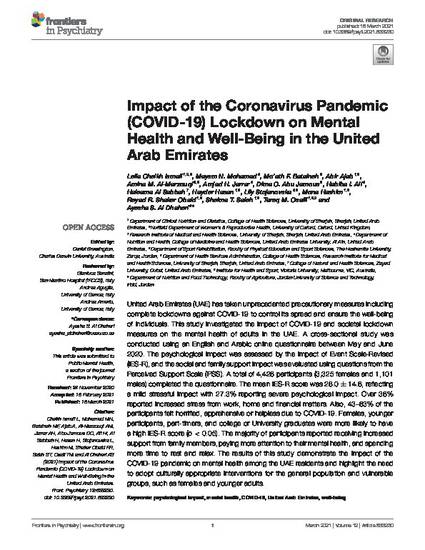
United Arab Emirates (UAE) has taken unprecedented precautionary measures including complete lockdowns against COVID-19 to control its spread and ensure the well-being of individuals. This study investigated the impact of COVID-19 and societal lockdown measures on the mental health of adults in the UAE. A cross-sectional study was conducted using an English and Arabic online questionnaire between May and June 2020. The psychological impact was assessed by the Impact of Event Scale-Revised (IES-R), and the social and family support impact was evaluated using questions from the Perceived Support Scale (PSS). A total of 4,426 participants (3,325 females and 1,101 males) completed the questionnaire. The mean IES-R score was 28.0 ± 14.6, reflecting a mild stressful impact with 27.3% reporting severe psychological impact. Over 36% reported increased stress from work, home and financial matters. Also, 43–63% of the participants felt horrified, apprehensive or helpless due to COVID-19. Females, younger participants, part-timers, and college or University graduates were more likely to have a high IES-R score (p < 0.05). The majority of participants reported receiving increased support from family members, paying more attention to their mental health, and spending more time to rest and relax. The results of this study demonstrate the impact of the COVID-19 pandemic on mental health among the UAE residents and highlight the need to adopt culturally appropriate interventions for the general population and vulnerable groups, such as females and younger adults.
- COVID-19,
- mental health,
- psychological impact,
- United Arab Emirates,
- well-being
Available at: http://works.bepress.com/haleama-alsabbah/9/
